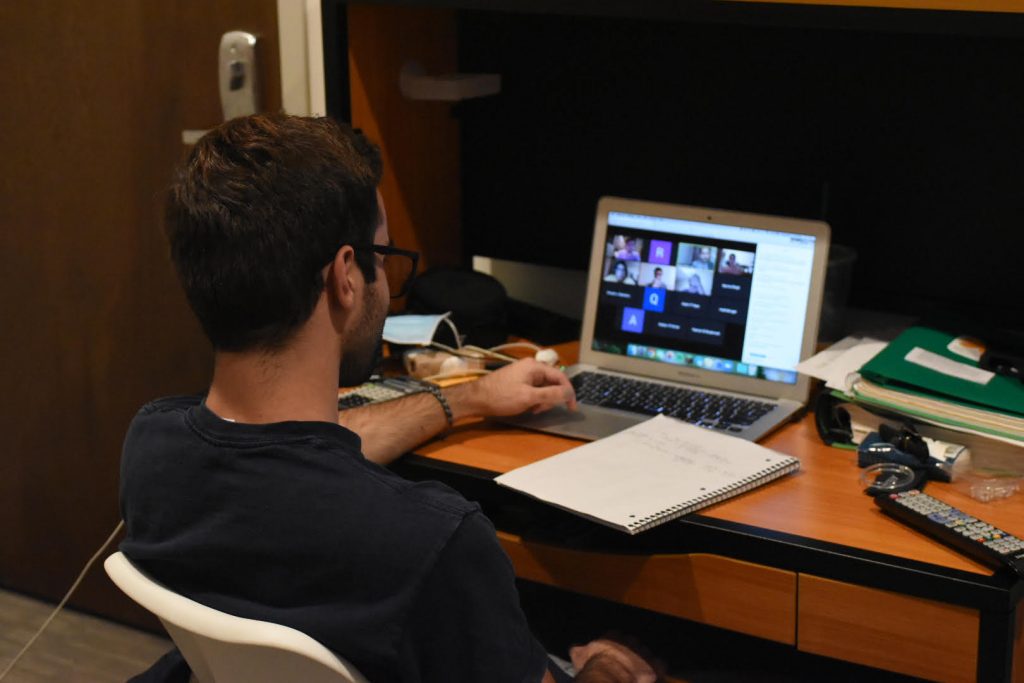While the coronavirus pandemic poses issues for students who find it difficult to do work in their homes, Binghamton University and the Off Campus College Council (OC3) have designated several study locations, on campus and off campus, respectively.
The Glenn G. Bartle Library will continue to operate during library hours, but with reduced capacity while maintaining social distancing. While students can still work in the Information Commons in the Bartle Library, there are fewer computers and reconfigured printing. The Science Library and the University Downtown Center (UDC) are also study spaces that offer printing.
There are designated rooms for students to participate in their online classes that do not require a reservation. They are located in Mandela Room A and B in the University Union, 1302 A-E in the Newcomb Reading Room, now called the Learning Lounge, and a number of rooms in the Classroom Wing, Fine Arts Building, Lecture Hall and the Innovative Technologies Complex (ITC).
While on-campus study spaces will not be able to accommodate as many people as they have in the past, there are new and existing study spaces off campus to make up for the lower capacity of on-campus study spaces.
The OC3 is a resource for all students, but focuses on providing educational services and programs for students living off campus. According to Sade Salazar, president of the OC3 and a senior double-majoring in philosophy, politics and law and economics, the OC3 has created a list of local religious organizations that are allowing students to utilize them as study spaces.
“The Off-Campus Programs coordinated with various community groups and sent us this list recently,” Salazar wrote in an email. “We are in the process of making all off-campus students aware of the different locations they can study off campus.”
The locations are Grace Point Church, a church in Broome County; Islamic Organization of the Southern Tier Community Center, a mosque in Johnson City; United Presbyterian Church, a church in Binghamton; Temple Concord-Kilmer Mansion, a synagogue in Binghamton and Newman House, a church in Binghamton. The OC3’s list includes the hours, locations and specific instructions for entering or reserving the spaces.
Other off-campus study spaces that students can go to are City Light Coffee in Downtown Binghamton, any nearby Starbucks, Barnes & Noble in the Town Square Mall and the Broome County Public Library.
Salazar believes that students who are worried about interacting with many people in an indoor study space should take certain precautions.
“We suggest students call locations beforehand if they want to avoid crowded study spaces,” Salazar wrote.
Wireless internet access on campus has been made accessible in multiple parking lots, increasing the amount of space where students are able to study outside. Parking lots G1, M3 and M4 will have Wi-Fi, and there will be signs posted that indicate there is Wi-Fi in that area. However, once the weather changes, students may struggle to find a solution.
Despite the access to study spaces, Erin Pierchala, a senior majoring in English, said she intends to study at home because it is safer, but thinks it is not an ideal place to get work done.
“I’ve been studying outside on campus a lot and that’s been good, but I think when it gets colder I probably won’t study on campus as much as I have in the past and will mostly study at home,” Pierchala wrote. “It’s safer, and I don’t have to wear a mask at home, but I am more easily distracted so I hope I can adjust to that. I haven’t checked out any new spaces yet, but I’ll probably try out different spots throughout the semester.”
Emily Collins, a senior majoring in English, agrees with Pierchala that studying at home will be more challenging.
“I have been studying outside only on campus which has been really nice, but once the weather gets cold I will study at home more,” Collins said. “But with studying at home, it will be harder to stay focused.”
Matthew DaSilva, a second-year graduate student studying Geographic Information Systems (GIS), plans to study at home for a different reason.
“I live off campus, so most of my work will be done in my room, which makes studying more difficult and it’s easy to get distracted,” DaSilva wrote. “I normally would [study on campus] but it’s easier to just stay home and not deal with getting to campus.”
In compliance with Gov. Andrew Cuomo’s executive order that requires everyone in New York to wear a face covering in public, all public study spaces require masks to be worn.



